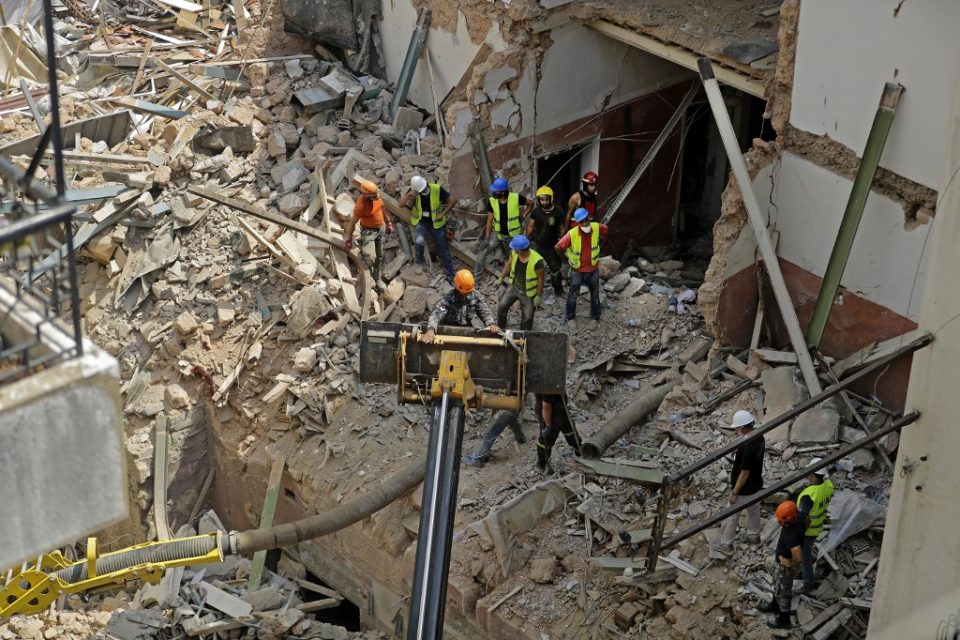
by Layal Abu Rahal and Dylan Collins
Agence France Presse
BEIRUT, Lebanon (AFP) — Rescuers resumed a search Friday for a possible survivor under the rubble in Beirut, buoyed by faint hopes of a miracle a month after a monster blast ripped through the city’s port.
The cataclysmic August 4 explosion killed 191 people, making it Lebanon’s deadliest peacetime disaster.
One month on, Lebanese across the grieving country observed a minute of silence on Friday, while seven people are still missing.
Hopes emerged Thursday that one of them could be found alive after a specialist sensor device detected a heartbeat under the debris of a collapsed building.
“I was not aware I needed a miracle that much. Please God, give Beirut this miracle it deserves,” said Selim Mourad, a 32-year-old filmmaker.
Chilean and Lebanese rescuers on Friday lifted rubble from the site between the hard-hit districts of Gemmayzeh and Mar Mikhail, an AFP photographer said.
Francisco Lermanda, the head of the Chilean team, told reporters late Friday that the rescue work was launched after experts detected slow breathing under the rubble at a depth of three metres (yards).
But it was still unclear if anyone was “alive or dead”, Lermanda said.
“We had to dig three tunnels to reach the spot where the pulse was detected,” he added.
A member of the Lebanese civil defence at the site said the operation could be halted in the evening and resume on Saturday morning.
The pulse had slowed significantly on Friday compared to a previous recording, rescue coordinator Nicholas Saade said earlier in the day.
“After removing the big chunks, we scanned again for heartbeats or respiration, it showed low beat/respiration” levels of seven per minute, he said. “The reading before was about 16 to 18.”
French civil engineer Emmanuel Durand, who is assisting the rescue effort, said 3D mapping scans of the building had so far shown no signs of life.
“What we have seen so far is, unfortunately, no trace of any victim or body. We have been conducting two scans on two different rooms,” he said.
– Chilean ‘heroes’ –
The area being excavated was among the hardest hit by the blast that was so powerful it was heard in Cyprus, some 240 kilometres (150 miles) away.
The explosion piled on new misery for Lebanese already reeling from the coronavirus pandemic and the country’s worst economic crisis in decades.
A sniffer dog deployed by Chilean rescuers responded Wednesday night to a scent from the site, Beirut governor Marwan Abboud said.
After detecting a pulse on Thursday, Lebanese rescuers teamed up with the Chileans to find survivors.
Lebanon lacks the tools and expertise to handle advanced search and rescue operations, which are now being supported by international experts.
The Chileans, who arrived recently with specialist sensors that can detect heartbeats and breathing, have been praised as heroes by many Lebanese.
Lebanese authorities came under more fire from an anxious public after Thursday’s search and rescue operation was paused for two hours.
The army said Friday the efforts had been halted because hunks of the building’s wall could fall on rescuers.
The stoppage sparked an outcry online.
“There is a heart beating in Mar Mikhail, and there are heartless officials who decided to stop the rescue operation,” activist Zahia Awad tweeted.
– ‘We still don’t know’ –
As well as killing more than 190 people, the explosion injured at least 6,500 and left 300,000 homeless.
Hassan Diab, who quit along with his government after the blast, said 2,750 tonnes of ammonium nitrate had blown up. The fertiliser had been stored in a warehouse for years without precautions.
Several gatherings organised by the army, civil society groups and families of the victims were held on Friday to mark one month since the blast, with many taking part in a minute of silence.
At the Beirut port, relatives of the deceased laid white flowers near a small stone monument bearing the names of all those killed in the blast.
“One month on, we still don’t know why the explosion happened and who is responsible,” said Michele, the sister of a port employee who was killed.
All 25 suspects identified by a blast probe, including port director-general Hassan Koraytem and customs chief Badri Daher, are in custody.
But political leaders, whose negligence and corruption are widely blamed for the explosion, have dodged arrest.
The lead investigator in the blast probe doesn’t have the authority to interrogate incumbents in government and parliament without recourse to a special judicial body.
The Vatican’s Secretary of State, Cardinal Pietro Parolin, was in Lebanon on Friday to express solidarity with the disaster-hit country.
“Lebanon is not alone,” he told a news conference.
© Agence France-Presse








